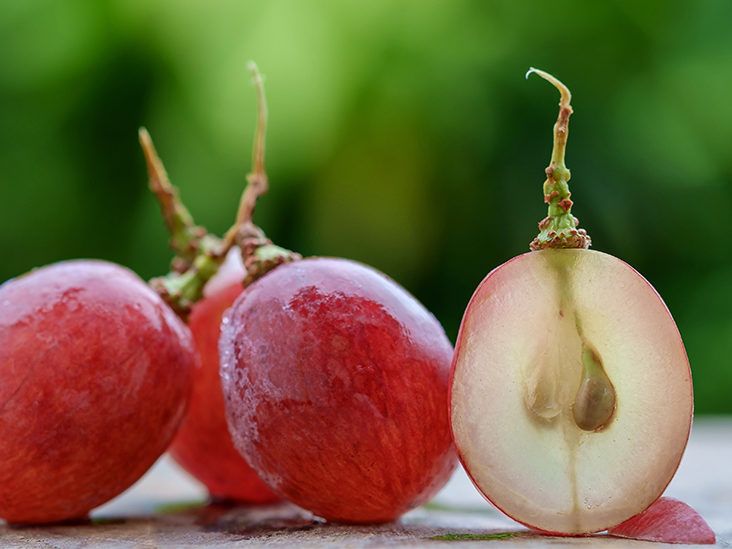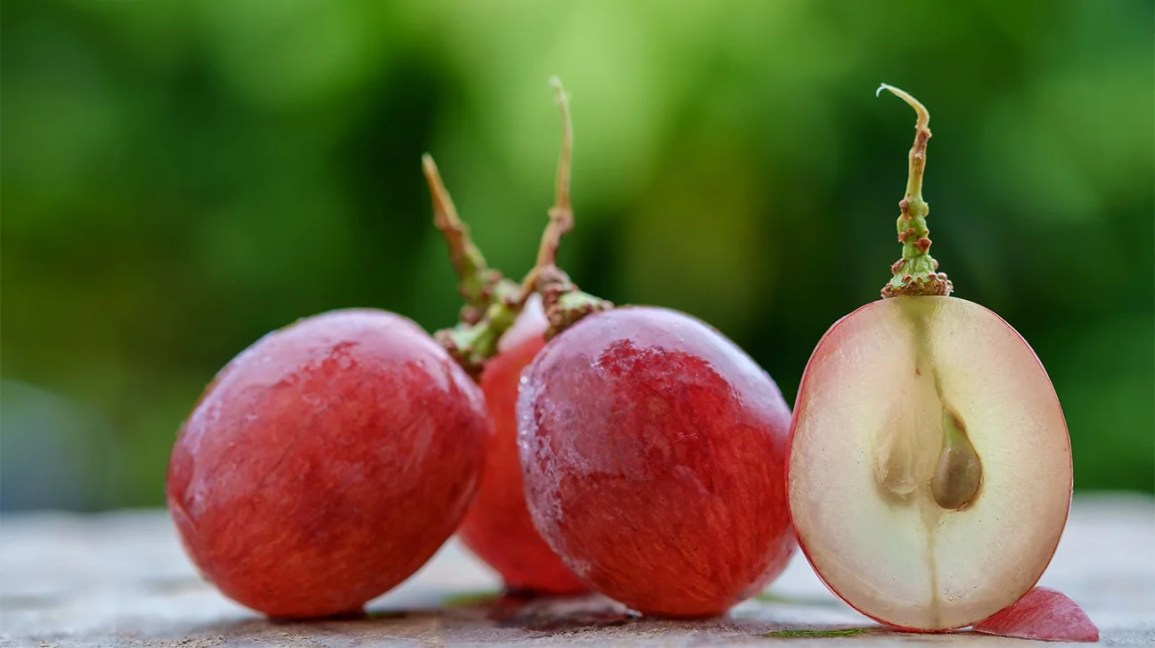Yes, you can eat grape seeds. They are safe and edible.
Many people wonder about the benefits and potential risks of consuming them. Grape seeds are often overlooked when eating grapes. Some people discard them, unsure if they are safe to eat. But grape seeds contain nutrients and antioxidants that can benefit your health.
They have been used in traditional medicine for their potential health benefits. Eating grape seeds might improve heart health and provide other advantages. In this blog, we will explore the reasons why you might consider eating grape seeds. We will also discuss any possible drawbacks. By the end, you’ll know more about the potential health impacts of grape seeds and how to incorporate them into your diet.
Introduction To Grape Seeds
Grape seeds are often discarded when eating grapes. But did you know they are edible? These small seeds are rich in nutrients and have various uses. Let’s dive into what makes grape seeds special.
Nutritional Content
Grape seeds are packed with antioxidants. These help protect your body from damage. They contain vitamin E, which is good for your skin. Grape seeds also have healthy fats. These fats support heart health. The seeds are a source of fiber. Fiber aids digestion and keeps you full. You can also find minerals like calcium and magnesium in grape seeds. These minerals are essential for bone health. Grape seeds are a small but mighty powerhouse of nutrition.
Common Uses
You can use grape seeds in many ways. Some people eat them whole. Others grind them into a powder. This powder can be added to smoothies. It boosts the nutritional value of your drink. Grape seed oil is another popular use. This oil is used in cooking and salads. It has a mild flavor and is good for your heart. Grape seed extract is found in supplements. These supplements claim to improve health. You can also find grape seed products in skincare. They are said to improve skin health.

Credit: fairshares.org
Nutritional Value
Grape seeds are often overlooked, but they pack a punch with nutrients. Eating grape seeds can offer numerous health benefits due to their rich nutritional profile. Discover the hidden treasures in grape seeds below.
Vitamins And Minerals
Grape seeds are full of essential vitamins and minerals. These nutrients are crucial for various body functions. Here is a brief look at what grape seeds contain:
| Vitamin/Mineral | Benefit |
|---|---|
| Vitamin E | Supports skin health and immune function |
| Vitamin C | Boosts the immune system and aids in collagen production |
| Magnesium | Helps muscle function and maintains heart health |
| Calcium | Strengthens bones and teeth |
Antioxidant Properties
Grape seeds are rich in antioxidants. These compounds protect your cells from damage.
- Polyphenols – Fight oxidative stress.
- Proanthocyanidins – Improve blood flow and reduce inflammation.
Eating grape seeds can help keep your body healthy. Antioxidants also slow down aging. They combat free radicals, which cause cell damage.
Health Benefits
Eating grape seeds might seem unusual, but these tiny seeds pack a punch. They are not just safe to eat but also come with several health benefits. Let’s explore how grape seeds can improve your well-being.
Cardiovascular Health
Grape seeds are rich in antioxidants. These antioxidants protect your heart. They reduce inflammation and improve blood flow. This helps lower the risk of heart disease. The seeds also contain flavonoids. Flavonoids can reduce bad cholesterol levels. Eating grape seeds supports a healthier heart.
Digestive Health
Grape seeds are high in fiber. Fiber aids in digestion. It helps keep your bowel movements regular. This prevents constipation. The seeds also promote the growth of good bacteria in your gut. A healthy gut means a stronger immune system. Grape seeds can contribute to better overall digestive health.
Potential Risks
Grape seeds are small but packed with nutrients. Though beneficial, they can pose risks. It’s important to know these risks before consuming them.
Allergies
Some people might be allergic to grape seeds. Allergies can cause symptoms like itching, swelling, and hives. In severe cases, it may lead to difficulty breathing. If you have a history of allergies, be cautious. Consult a doctor if you notice any unusual symptoms.
Digestive Issues
Grape seeds can be hard to digest. Eating them in large amounts might cause stomach pain. Some people may experience constipation or diarrhea. Those with sensitive stomachs should avoid eating too many grape seeds.
Grape Seeds In Diet
Grape seeds are often overlooked. Yet, they pack a punch of nutrients. Rich in antioxidants, they offer several health benefits. Including them in your diet can be easy and tasty. Let’s explore how to consume grape seeds and how to incorporate them into recipes.
How To Consume
You can eat grape seeds raw. Just chew them well. This helps to release their nutrients. Some people prefer to grind them. Ground grape seeds can be added to smoothies. You can also swallow whole seeds with water. They are safe to consume this way.
Incorporating In Recipes
Ground grape seeds can enhance many dishes. Sprinkle them on salads for a crunchy texture. Add them to yogurt or oatmeal for a nutrient boost. They blend well in baked goods too. Mix them into muffin or bread batter. Grape seeds can also be used in sauces. They add a subtle, nutty flavor. Your meals will be healthier and more delicious.
Scientific Studies
Can you eat grape seeds? This question has sparked various scientific studies. Let’s delve into what recent research and expert opinions reveal about grape seeds.
Recent Research
Recent research shows that grape seeds are rich in antioxidants. These antioxidants can help protect cells from damage. Studies also suggest grape seeds may have anti-inflammatory properties. They might even support heart health. Some research indicates potential benefits for skin health as well.
Expert Opinions
Experts have mixed opinions on eating grape seeds. Some nutritionists recommend them for their health benefits. They point out the high levels of vitamins and minerals. Other experts urge caution. They worry about potential digestive issues. They suggest moderation and proper preparation.
Comparing Grape Seeds With Other Seeds
Grape seeds are often overlooked, yet they pack a punch of nutrients. But how do they compare with other popular seeds like chia, flax, and sunflower? Let’s dive into a detailed comparison.
Nutritional Comparison
Each type of seed has its own unique nutritional profile. Here’s a comparison of grape seeds with other seeds:
| Seed Type | Calories (per 100g) | Protein (g) | Fiber (g) | Fat (g) | Vitamins & Minerals |
|---|---|---|---|---|---|
| Grape Seeds | 450 | 14 | 27 | 16 | Vitamin E, Zinc, Magnesium |
| Chia Seeds | 486 | 16 | 34 | 30 | Calcium, Phosphorus, Omega-3 |
| Flax Seeds | 534 | 18 | 27 | 42 | Omega-3, Lignans, Manganese |
| Sunflower Seeds | 584 | 21 | 8.6 | 51 | Vitamin E, Selenium, Copper |
Health Benefits Comparison
Each seed offers various health benefits. Here’s how grape seeds compare:
- Grape Seeds: Contain antioxidants, support heart health, and aid in skin repair.
- Chia Seeds: High in omega-3 fatty acids, support digestive health, and boost energy.
- Flax Seeds: Rich in omega-3s, improve cholesterol levels, and reduce cancer risk.
- Sunflower Seeds: High in vitamin E, boost immune function, and promote skin health.
Including a variety of seeds in your diet ensures a wide range of nutrients and health benefits.
:max_bytes(150000):strip_icc()/GettyImages-1448274581-8060c1d059ae485ab296432a0bf08e4c.jpg)
Credit: www.southernliving.com

Credit: www.healthline.com
Frequently Asked Questions
Are Grape Seeds Safe To Eat?
Yes, grape seeds are safe to eat. They contain antioxidants and healthy fats. However, some people may find them bitter.
What Are The Benefits Of Grape Seeds?
Grape seeds are rich in antioxidants. They help reduce inflammation and support heart health. They also improve skin and circulation.
Can Eating Grape Seeds Cause Digestive Issues?
Most people can eat grape seeds without issues. However, some might experience minor digestive discomfort. Chewing them well can help.
How Do Grape Seeds Taste?
Grape seeds have a slightly bitter taste. They can add a crunchy texture to dishes. Some people may not enjoy the bitterness.
Conclusion
Eating grape seeds can be beneficial for your health. They are rich in antioxidants and vitamins. These nutrients support your heart and immune system. Grape seeds also help improve skin health. Some people may find them bitter or hard to chew.
You can buy grape seed extract as an alternative. Always consult your doctor before making changes to your diet. Enjoy grapes and their seeds for a healthy snack. Remember, moderation is key to a balanced diet. Stay informed, and make choices that suit your needs.
